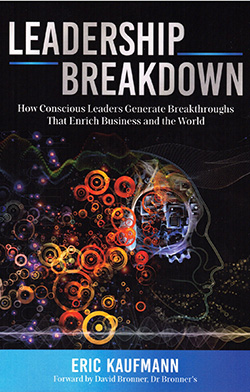Leadership Breakdown: How Conscious Leaders Generate Breakthroughs That Enrich Business and the World by Eric Kaufmann; Beverly Hills Publishing © 2023; ISBN 9798986-155029; 196 pages; $18.97 on Amazon.

 SAN DIEGO – San Diegan Eric Kaufmann is an executive coach who teaches managers, team leaders and executives that they need to utilize three essential elements of their personalities to achieve success: their wisdom, love and power. To actualize these qualities, he writes, one must correct one’s “ego myopia—the inability to recognize and manage your ego.”
SAN DIEGO – San Diegan Eric Kaufmann is an executive coach who teaches managers, team leaders and executives that they need to utilize three essential elements of their personalities to achieve success: their wisdom, love and power. To actualize these qualities, he writes, one must correct one’s “ego myopia—the inability to recognize and manage your ego.”
Let’s take a look at each of the essential elements of a good leader’s tool box. Wisdom, Love and Power.
“Wisdom enables us to clearly see ourselves and the world around us,” Kaufmann tells us. “The objective clarity of wisdom refines decision-making, problem-solving, and understanding people’s motives.”
A member of Tifereth Israel Synagogue, Kaufmann draws on the wisdom of the Bible’s King Solomon, who, according to Jewish folklore, taught “this too shall pass.” Kaufmann says that understanding that everything is impermanent and eventually will change allows leaders to release their “addiction to fixity,” to jettison such thoughts as “this is the way we’ve always done it,” and to accept, even welcome, change. “When you stop fearing the mystery of uncertainty and approach it with deep curiosity, you open your mind’s door, and cultivate a steady stream of applied wisdom,” Kaufmann instructs.
There are three emotions that can block the attainment of wisdom, he says. These are prejudice—“seeing what you want to see,” anger—“wanting to force change,” and denial –rejecting reality.”
Consciously cultivating curiosity, self-awareness, and mindfulness can help overcome those negative emotions and help a leader more clearly see him/herself and the encompassing world. Kaufmann offers tips for how these qualities may be cultivated.
“Loving-kindness unlocks the door to the heart, relaxes our judgmental mind, and lights the candle of intimacy,” Kaufmann writes. “This practice fuels our feelings of connectedness and engenders compassion, inclusion, and mutual care and trust.”
Kaufmann defines “loving-kindness” or “love” as “giving without expectations. Love is tending to someone by giving your attention and energy. It’s behaving in ways that help the other person feel included and safe. And it’s about doing things that help someone succeed.” A leader who manifests these qualities will heighten a team’s engagement and productivity.
As with wisdom, there are behaviors that block a leader from truly caring about the well-being of the team. They might be the leader’s sense of entitlement — that s/he is deserving, the team is not; arrogance—that s/he is more intelligent and capable than the other team members; and being judgmental – that team members simply don’t measure up to the leader’s personal, non-organizational, expectations.
Kaufmann offers remedies that can overcome these behaviors. He urges leaders to internalize gratitude, compassion, and humility. As with wisdom, Kaufmann offers ways to achieve these commendable qualities.
Power — “Charging up your emotional stamina, turning up your confidence, and increasing your vitality energizes and fuels your innate power and personal agency,” Kaufmann asserts.
He writes that leaders demonstrate power when they share their gifts “without shame, without apology” and without making themselves small. “Power is affecting intentional change.”
Unfortunately, some leaders “leak” their power, according to Kaufmann. They engage in blaming; are defeated by “anxiousness,” and modify their thoughts and good judgment for the purposes of “people-pleasing,” or put another way, they sacrifice their authentic thoughts to win favor with other people, whether they be superiors, peers, or subordinates.
Again, Kaufmann offers remedies. Understand that when you blame others, you give up your own power; in essence, you are saying that the person whom you blamed was more powerful than you were in that situation. Anxiousness can be stilled by “learning to be present, to keep your attention zoomed in to here and now.” The opposite of “people-pleasing” is “authenticity,” involving being true to your “inner integrity.”
There is much to absorb in Kaufmann’s thoughtful book, which he writes with humor and with dialogue between himself and an actual client, who he has renamed “Nick.”
At the beginning of the book are testimonials to Kaufmann’s work from other authors as well as from clients and colleagues who identify themselves and their companies. Among them are executives with Verizon, WD-40, Marsh & McLennan Agency, SDG&E, Clinicient; Cymer Lightsource; Mission Fed; Dr. Bronners; Aurora; and Harvard Medical School.
*
Donald H. Harrison is editor emeritus of San Diego Jewish World. He may be contacted via donald.harrison@sdjewishworld.com